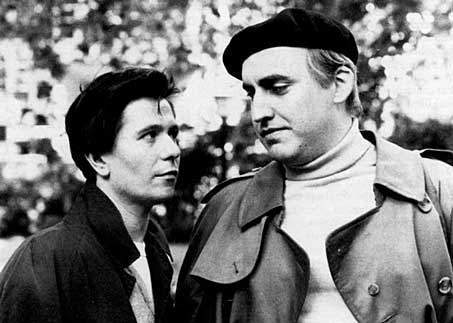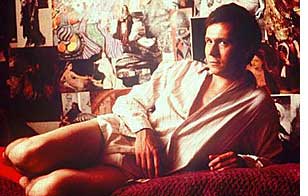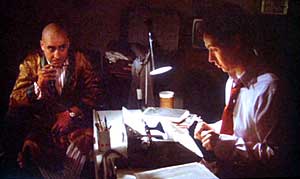
 |
||||||
|
GAY
FILM REVIEWS BY MICHAEL D. KLEMM
|
||||||
|
My Beautiful Laundrette MGM Video, Director: Screenplay: Starring:
Rated R, 98 minutes
Prick Up Your Ears MGM Video, Director: Screenplay: Starring: Rated R, 110 minutes
|
Indie
Picture Double Feature Before achieving international success with Dangerous Liasions and The Grifters, Stephen Frears directed two independent films that featured a gay couple at the center of the action. The first, a work of fiction, presented a very positive portrayal of two men in love. The second, a biography on the life of British playwright Joe Orton, was a study in dysfunction to the ninth degree.
My Beautiful Laundrette (1985) is a tale of "forbidden love" that features Gordon Warneck and a young Daniel Day Lewis as lovers set against a backdrop of the problems faced by Pakastanis living in South London. Warnecke plays Omar, a handsome Pakastani youth who cares for his sick father (Roshan Seth). When Omar goes to work for his seedy and wealthy Uncle Nasser, he is quickly seduced by the London underworld and the lure of fast money. Nasser is played by Saeed Jaffrey (He played sidekick to Sean Connery and Michael Caine in John Huston's film of Rudyard Kipling's The Man Who Would Be King). He hands over the management of a run-down laundrette to Omar, while meanwhile hoping to groom him for a position of power - and marry off his difficult daughter Tanya.
Despite its serious intent and complicated plot, My Beautiful Laundrette is for the most part comic. It was also the subject of much controversy amongst London's Pakastani community when it was first aired. That this was filmed for Britain's Channel 4 is certainly a comment on the sad state of American television. My Beautiful Laundrette contains some of the most tender love scenes between men ever filmed. And it certainly didn't hurt the up-and-coming career of Daniel Day Lewis. (Are you listening Hollywood?)
|
 |
|
|
Prick Up Your Ears (1987) boasts bravura performances by Gary Oldman and Alfred Molina as playwright Joe Orton and his unbalanced lover, Kenneth Halliwell. Orton was the toast of the London stage in the mid 1960s, delighting and shocking audiences with such black comedies as Loot, What The Butler Saw and Entertaining Mr. Sloan. Like Oscar Wilde before him, Orton was gay and his biting satires attacked upper class manners. Both artists were silenced at the height of their craft. In Orton's case, his fall came as the result of a jealous and ignored partner - who brutally murdered him with a hammer.
|
|
|
|
|
|
|
|
 Orton
was a true iconoclast who lived by his own rules without guilt. He would
go to great lengths to shock people, even using his own mother's false teeth
as a prop in one of his plays. The extent of his promiscuity is nowhere
more apparent than when he picks up a working class stiff in an abandoned
warehouse on the day of his mother's funeral. While perhaps lacking as a
definitive film biography, Prick Up Your Ears
is strongest when depicting Orton and Halliwell's "marriage from hell." Orton
was a true iconoclast who lived by his own rules without guilt. He would
go to great lengths to shock people, even using his own mother's false teeth
as a prop in one of his plays. The extent of his promiscuity is nowhere
more apparent than when he picks up a working class stiff in an abandoned
warehouse on the day of his mother's funeral. While perhaps lacking as a
definitive film biography, Prick Up Your Ears
is strongest when depicting Orton and Halliwell's "marriage from hell."
|
|
 In
the politically correct 90s, when most gay groups are clamoring for positive
portrayals of gays on the silver screen, this might seemlike a step backwards.
To present Orton in any other manner, however, would be dishonest. At the
time of its original release, the film was quite daring. Frears' directing,
combined with top-notch acting, a terrific script by playwright Alan Bennett,
and a fine attention to period details make Prick Up Your Ears a
film well worth renting. In
the politically correct 90s, when most gay groups are clamoring for positive
portrayals of gays on the silver screen, this might seemlike a step backwards.
To present Orton in any other manner, however, would be dishonest. At the
time of its original release, the film was quite daring. Frears' directing,
combined with top-notch acting, a terrific script by playwright Alan Bennett,
and a fine attention to period details make Prick Up Your Ears a
film well worth renting.
|
|
|
[Reviewer's note, 2008: I just watched Prick Up Your Ears again and it is still a great film. In retrospect, Halliwell's portrayal may have been exaggerated (reports say that we wasn't that grotesque) yet Alfred Molina is so good that Halliwell doesn't come across as a cartoon. You'd want to kill him if he lived with you but he still inspires pity. Gary Oldman is nothing short of brilliant as Orton and their scenes together are screen magic. I'd forgotten how funny it sometimes is in a black comedy sort of way. In fact, their life together is depicted as if it was an Orton play. Consider the scene where Orton tells Halliwell to "go have a wank" and Halliwell shrieks "Have a wank? Did you say have a WANK??? Do you know how long it takes me to get ready to have a wank?" |
|
|
|
|
|
Alfred Molina also appears in: Vanessa
Redgrave also appears in: More on Britain's
Channel 4: |